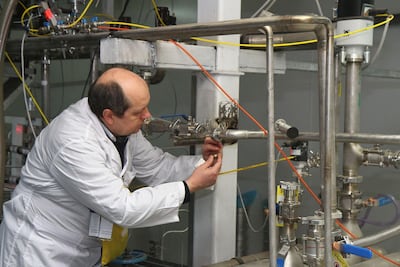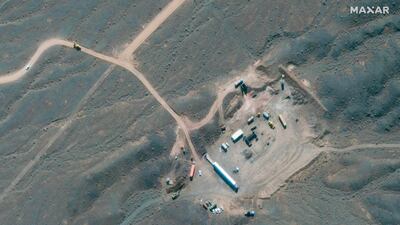Iran urged the UN nuclear watchdog to avoid publishing “unnecessary” details on Tehran’s nuclear programme, state TV reported on Sunday.
Iran’s nuclear department asked the International Atomic Energy Agency to avoid publishing details that may cause confusion among the international community.
On Saturday, Germany, France and Britain said Tehran had “no credible civilian use” for its refinement of uranium metal.
They pressed Iran to drop its plan to develop uranium, calling it Tehran's latest planned breach of its 2015 nuclear deal with world powers.
The goal of the deal was to prevent Iran from developing a nuclear bomb, which the country insists it does not want to do.
“The production of uranium metal has potentially grave military implications,” the three nations said.
On Thursday, the IAEA said Iran had informed it that it had begun installing equipment for the production of uranium metal.
It said Tehran insisted its plans for research and development on uranium production were part of its “declared aim to design an improved type of fuel".
Tehran has long believed results of the agency's inspections have been leaked, causing it further problems.
In December, the country’s parliament passed a law to suspend, in late February, inspections included in the nuclear deal if US banking and oil sanctions remained in place.
But it said inspections not listed in the deal would continue because the nation was a member of the non-proliferation treaty.
Iran reacted to the European statement on Sunday by saying it told the UN nuclear watchdog nearly two decades ago of its plans for the “peaceful and conventional” production of uranium metal.
It said it provided updated information to the agency two years ago about its plans to produce silicide advanced fuel.
Tehran said uranium metal was an “intermediate product” in making uranium silicide, a fuel used in nuclear reactors, which is safer and generates more power than the uranium oxide-based fuel Iran currently produces.

Later on Sunday, Iran’s Foreign Minister Javad Zarif tweeted criticism of the Europeans for their failure in saving the nuclear deal after the US withdrawal.
Mr Zarif said the deal remained alive because Iran did not withdraw from it, not because of Britain, France and Germany.
He also criticised what he described as Europe’s need for US Treasury approval of every banking transaction with Iran.
The three European nations alongside the US, Russia and China signed the 2015 nuclear deal with Iran, which prohibited research and production of uranium metal.
President Donald Trump in 2018 withdrew the US from the deal, in which Tehran had agreed to limit its uranium enrichment in exchange for the lifting of economic sanctions.
After the US expanded sanctions, Iran gradually and publicly abandoned the deal’s limits on its nuclear development.
President-elect Joe Biden, who was vice president when the deal was signed during the Obama administration, has said he hopes to return the US to the deal.


